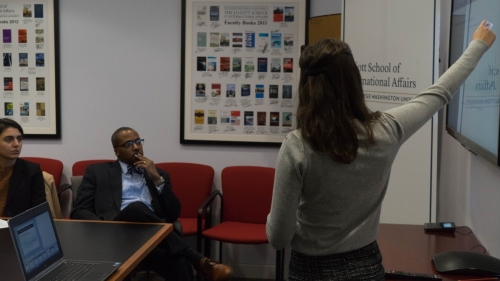WASHINGTON, DC – When Elliott School senior, Hannah Hassani, returned from presenting her research on labor migration from the Philippines in San Francisco last semester, she decided to start a movement at the Elliott School of International Affairs for fellow students to do the same. She wanted to give other students the opportunity to present their own research to peers and faculty and receive feedback to help further discovery and development.
“I saw that there was no avenue to present at the Elliott School,” said Hassani. “So I emailed Dean Harrison and Kaylie, and they said we’d love to do this, so we got started this semester.”
Elliott School juniors and seniors have the opportunity through the Undergraduate Scholars Program to submit research for credit, fellowships, grants, or publication. With no outlet for students, either undergraduate or graduate, to simply show research gathered and receive feedback to develop it further, Hassani reached out to Hope Harrison, Associate Dean for Research at the Elliott School of International Affairs, and her assistant, Kaylie Brassfield, to get the ball rolling on setting up a platform for all students to present ongoing or finished research. The Student Research Forum was born with a crowdsourcing Google form, asking Elliott School students what they had been working on.
“I envision it being a self-sustaining, on-going process,” said Hassani. “If a student is interested, they can fill out the form and at any point in the semester, just like professors, they can present their work… Some of the students wrote their thesis and they want to present it, and there are others who have an idea and they want feedback from the community so that they can work on it some more. There’s just so much that you can research. You can have any small idea and explore that.”
The inaugural Student Research Forum took place on November 21 with students presenting their work in varied areas of overseas research. Ashley Alessandra, MA ’18, explored post-conflict transformation in, “Protecting the Right to Life of the Internally Displaced: An Examination of Encampment and its Effects on the Communities in Unyama and Koro Sub-Counties in Gulu District, Northern Uganda.” Lacy Myrman, MA ’17, conducted interviews on identity for, “Shared Identities and Displacement: Rwandese Genocide Survivors’ Perceptions of Burundian Refugees.” As both women offered their findings to the room of fellow students, parents, and faculty, they defended their research, answering difficult questions posed by Dean Reuben Brigety throughout.
“What we really want to foster is a dialogue where students and faculty are coming together, talking about their work, and learning and making the next iteration of either this project or some other project better,” Harrison said to the room after both presentations.
The director of the Institute for African Studies, Richard Grinker, also gave feedback for each student researcher, suggesting ways to strengthen the presentations and to build on the framework of knowledge that is already published in the research universe.
“If you don’t get comments and critique, then you didn’t do a good job. Look at all the notes I wrote. That’s because I was so interested,” said Grinker, flipping through his pages of notes and questions jotted down during the presentations.
If you are an Elliott School undergraduate or graduate student interested in presenting your research next semester, please fill out this form to apply.
###


